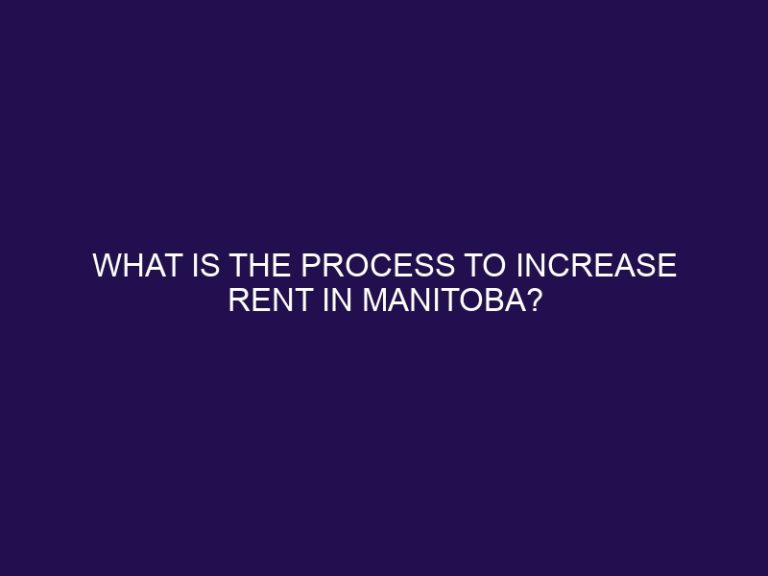What is the process to increase rent in Quebec?
.jpg)
“Rent control laws in Quebec play a crucial role in regulating rent increases and ensuring fair treatment for tenants. Understanding the process and guidelines for rent increases is important for both landlords and tenants. This article explores the process to increase rent in Quebec, taking into account rent control laws and exceptions.
“Rent control refers to the government’s regulations on the amount and frequency of rent increases. In Quebec, the Régie du logement is the governing authority responsible for overseeing rent control and resolving disputes between landlords and tenants.
The process to increase rent in Quebec involves several steps. The first step is providing written notice to the tenant, informing them of the proposed rent increase. This notice must include specific information as required by the Régie du logement. After receiving the notice, the tenant has the right to respond within a specified period.
“Once the tenant responds, the landlord can proceed with applying the approved rent increase. However, it is essential to follow the guidelines set by the Régie du logement to ensure compliance with rent increase limits.
Certain exceptions apply to rent increase guidelines in Quebec. For instance, new construction properties are generally exempt from rent control laws. Substantial renovations and changes in major municipal taxes can also provide exemptions under specific circumstances.
“In case of any disputes or disagreements, tenants have recourse in Quebec. They can challenge a rent increase if they believe it does not comply with the regulations. The Régie du logement also offers mediation and resolution services to help landlords and tenants find a fair resolution.
By understanding the process and guidelines for rent increases in Quebec, landlords and tenants can ensure compliance with the law and maintain a harmonious landlord-tenant relationship.
Key takeaway:
- Rent increase process in Quebec: To increase rent in Quebec, landlords must follow a specific process. This includes providing written notice, waiting for the tenant’s response, and applying the approved rent increase.
- Rent control laws in Quebec: Quebec has rent control laws in place to protect tenants. These laws outline guidelines for rent increases that landlords must follow.
- Exceptions to rent increase guidelines: There are exemptions to rent increase guidelines in Quebec, such as for new construction, substantial renovations, and changes in major municipal taxes. These exemptions allow landlords to increase rent beyond the usual guidelines.
Understanding Rent Control Laws in Quebec
Understanding rent control laws in Quebec is of utmost importance for both tenants and landlords. These laws are designed to safeguard tenants by preventing exorbitant increases in rent and ensuring the availability of affordable housing. In the province of Quebec, the regulatory authority responsible for rent control is the Régie du logement. Landlords can only raise the rent based on specific factors, such as municipal tax costs or significant renovations. It is imperative for landlords to acquaint themselves with these regulations to avoid any legal complications. Likewise, tenants must be aware of their rights and the conditions that landlords must meet in order to justify a rent increase. A solid understanding of rent control laws in Quebec is fundamental in order to maintain a fair and balanced rental market.
What is Rent Control?
Rent control, also known as rent stabilization, is a government policy implemented to address the issue of rising rents. It sets limits on the amount by which landlords can raise rents each year, thereby protecting tenants from excessive rent hikes and ensuring stable housing costs. Rent control laws vary depending on the jurisdiction, but they typically specify the maximum percentage increase allowed annually.
In Quebec, Canada, rent control is overseen by the Régie du logement. This regulatory authority sets specific guidelines for landlords regarding rent increases, taking into consideration various factors such as inflation and market conditions. By doing so, rent control in Quebec aims to provide stability and affordability for tenants, enabling them to maintain their housing expenses within a reasonable range.
So, in summary, rent control is a government policy that limits rent increases, safeguarding tenants from exorbitant hikes and offering them the benefits of stability and reasonable housing costs.
Rent Increase Guidelines in Quebec
Rent Increase Guidelines in Quebec provide a framework for landlords to follow when raising the rent for their tenants. These guidelines aim to balance the interests of both landlords and tenants while ensuring that rent increases are fair and reasonable. In Quebec, Rent Increase Guidelines can only occur once a year and must be based on the maximum percentage set by the Rental Board. This percentage is determined annually and takes into account factors such as the Consumer Price Index. By adhering to these Rent Increase Guidelines, landlords can ensure they are acting within the legal limits and tenants can have peace of mind knowing their rent increases are regulated.
The Process to Increase Rent in Quebec
Want to know how to increase rent in Quebec? Discover the step-by-step process in this section. First, you’ll learn about providing written notice to your tenant. Then, we’ll discuss waiting for their response and finally applying the approved rent increase. Stay tuned to learn the ins and outs of the rent increase process in Quebec and ensure you navigate it successfully.
Step 1: Provide Written Notice
Providing written notice is the first step in the process of increasing rent in Quebec. It is crucial to follow this initial step correctly to ensure compliance with the law and maintain a positive relationship with the tenant. To initiate the rent increase process transparently and in a legally sound manner, landlords should adhere to Step 1: Provide Written Notice.
The written notice should contain essential details such as the date, the current rent amount, the proposed rent increase, and the effective date of the increase. It is recommended to use registered mail or hand-delivery with a witness to confirm that the tenant has received the notice.
By incorporating Step 1: Provide Written Notice, landlords can effectively commence the rent increase process in accordance with the law and preserve a healthy tenant-landlord relationship.
| Step 1 | Provide Written Notice |
| Details | Date, current rent amount, proposed increase, effective date |
| Delivery | Registered mail or hand-delivery with witness |
Step 2: Wait for the Tenant’s Response
After providing written notice for a rent increase in Quebec, Step 2: Wait for the Tenant’s Response is the next important step in the process that requires patience and understanding.
- Give the tenant a reasonable amount of time to review the rent increase notice.
- During this waiting period, be prepared to answer any questions or concerns the tenant may have.
- Allow the tenant the opportunity to provide feedback or negotiate the proposed increase.
- Consider any valid reasons the tenant may have for objecting to the increase.
- Engage in open and honest communication to find a mutually beneficial solution.
Pro-tip: Keeping open lines of communication and demonstrating empathy towards the tenant’s concerns can help foster a positive relationship and resolve any issues that may arise during this process.
Step 3: Apply the Approved Rent Increase
- Calculate the approved increase: Determine the percentage increase allowed by referring to the guidelines set by the Régie du logement.
- Prepare the written notice: Create a formal notice detailing the new rent amount, effective date, and reasons for the increase.
- Apply the Approved Rent Increase: Deliver the notice: Serve the notice to the tenant through registered mail or in person, ensuring proof of delivery.
- Wait for the tenant’s response: Allow the tenant 30 days to contest the increase or request mediation.
- Implement the increase: If no objection is raised, apply the approved increase on the agreed-upon date.
Fact: Quebec’s rent control laws aim to strike a balance between protecting tenants and allowing landlords to make fair adjustments to rental rates.
Exceptions to Rent Increase Guidelines in Quebec
When it comes to increasing rent in Quebec, there are certain exceptions that landlords need to be aware of. In this section, we’ll explore these exceptions and delve into three key sub-sections. We’ll uncover the exemptions for new construction, substantial renovations, and changes in major municipal taxes. These exemptions play a crucial role in understanding the guidelines and procedures for rent increase in Quebec. So, let’s dive in and gain a comprehensive understanding of the exceptions in place.
Exemptions for New Construction
Exemptions for new construction in Quebec allow landlords to increase rent beyond the usual guidelines. These exemptions, which are subject to certain conditions and criteria set by the Régie du logement, provide an opportunity for landlords to recoup their expenses and ensure the long-term viability of the rental property. This applies when the property is newly constructed or when significant renovations have been made. The purpose of these exemptions is to compensate landlords for the investment they have made in improving the quality of the rental units, while also maintaining a fair balance between the rights of landlords and tenants.
Exemptions for Substantial Renovations
Exemptions for Substantial Renovations can be an exemption to the rent increase guidelines in Quebec. When a landlord carries out major renovations to improve the rental property, they may be eligible to increase the rent beyond the usual limits. These renovations must significantly enhance the value or quality of the property, such as structural modifications or upgrades to plumbing or electrical systems. Landlords must obtain the necessary permits and provide proper documentation to justify the rent increase. It’s important for tenants to be aware of their rights and to understand the criteria for substantial renovations as outlined in Quebec’s rental laws.
Exemptions for Changes in Major Municipal Taxes
Exemptions for changes in major municipal taxes in Quebec can have an impact on the process of rent increase. In situations where there are significant changes in municipal taxes, landlords may be exempt from following the usual guidelines for increasing rent. This implies that they have the ability to raise the rent beyond the prescribed limits determined by the province. However, it is important to remember that these exemptions are applicable only in certain circumstances and are contingent upon specific conditions. To implement the rent increase, landlords must provide evidence of the changes in municipal taxes and adhere to the proper procedures. In case tenants believe that the increase is unjustified, they have the right to challenge it.
Recourse for Tenants in Quebec
In Quebec, tenants have recourse when facing rent increases. Let’s uncover the options available in this section: challenging a rent increase and utilizing mediation and resolution services. Find out how these avenues can help tenants navigate and negotiate their rent situations effectively. From understanding tenant rights to exploring legal frameworks, we’ll explore the tools and resources that empower tenants in Quebec to address rent increases with confidence.
Challenging a Rent Increase
Challenging a Rent Increase in Quebec can be a daunting task, but it is crucial to protect tenants’ rights. Here are the specific steps you need to follow:
1. Review the notice: Carefully examine the written notice provided by the landlord to understand all the details of the rent increase.
2. Gather evidence: It is essential to collect concrete evidence that supports your case. This can include documents, photographs, or even testimonies from witnesses, all demonstrating that the increase is unjust or unreasonable.
3. Contact the landlord: Take the initiative to discuss your concerns with the landlord. Try to negotiate a fair resolution before taking any further action.
4. File a complaint: If an agreement cannot be reached through dialogue, you must file a complaint with the Regie du logement. Remember to provide all the relevant evidence of the unjust rent increase along with your complaint.
5. Attend the hearing: Prepare your case thoroughly and make sure to attend the hearing. This will give you an opportunity to present your evidence and arguments directly to the Regie du logement.
6. Wait for the decision: After the hearing, all you can do is wait for the decision from the Regie du logement. Their decision will ultimately determine whether the rent increase is justified or not.
7. Follow the decision: If the decision is in your favor, the rent increase may be reduced or even canceled altogether. However, if the decision does not go in your favor, you might have to explore other options like seeking legal advice or finding alternative housing.
Remember, challenging a rent increase is your right as a tenant, and by following these steps, you can protect your rights and ensure a fair resolution.
Mediation and Resolution Services
Mediation and resolution services are paramount when it comes to addressing conflicts between landlords and tenants concerning rent increases in Quebec. These services serve the purpose of establishing a fair and unbiased platform for both parties to express their concerns and discover a mutually acceptable resolution. Tenants have the option to utilize these services in order to challenge a rent increase that they perceive as unjust or excessive. Mediators play a crucial role in facilitating discussions and negotiations, ensuring that the best interests of both landlords and tenants are taken into consideration. By employing mediation and resolution services, conflicts can be resolved in a harmonious manner, ultimately saving valuable time and money for all parties involved.
Some Facts About How To Increase Rent in Quebec:
- ✅ Landlords in Quebec can increase rent annually but must follow the rules set by the Regie du Logement. (Source: Rental Awareness)
- ✅ Quebec has unique regulations for rental properties, outlined in the civil code of Quebec and the Quebec Residential Tenancies Act. (Source: Rental Awareness)
- ✅ Rent increases in Quebec are limited and must adhere to the yearly rental index, with the allowed increase for 2021 being 0.8%. (Source: Rental Awareness)
- ✅ Landlords must provide tenants with written notice of lease modifications within the required time frame. (Source: CACV Verdun)
- ✅ For leases of 12 months or more, landlords can send rent increase notices between 3 to 6 months before the end of the lease. (Source: CACV Verdun)
Frequently Asked Questions
What is the process to increase rent in Quebec?
In Quebec, the process to increase rent involves several steps and follows specific rules. Here is a detailed explanation of the process:
1. Notify the tenant: The landlord must provide a written notice to the tenant at least three months before the proposed rent increase. The notice should include the new rental amount and the effective date of the increase.
2. Calculate the rent increase: The landlord can use the Tribunal administratif du logement’s tool to calculate the rent increase based on the criteria established in the Regulation respecting the fixing of rent.
3. Share the results with the tenant: After calculating the rent increase, the landlord must share the results with the tenant. This allows both parties to review and discuss the proposed increase.
4. Tenant’s response: The tenant has one month to accept or refuse the rent increase. If the tenant accepts the increase, the new rental amount becomes effective on the agreed-upon date. If the tenant refuses, the landlord can proceed with filing an Application to modify the lease with the Tribunal administratif du logement.
5. Filing an Application to modify the lease: If an agreement cannot be reached, the landlord must file an Application to modify the lease with the Tribunal administratif du logement within a month of the tenant’s refusal. The landlord must provide all relevant vouchers, including the building’s revenue and expenses.
6. Tribunal hearing: Both parties will receive a notice of hearing from the Tribunal administratif du logement. The landlord must attend the hearing with all necessary documentation, and the Tribunal will make a decision based on the presented evidence and legal regulations.







